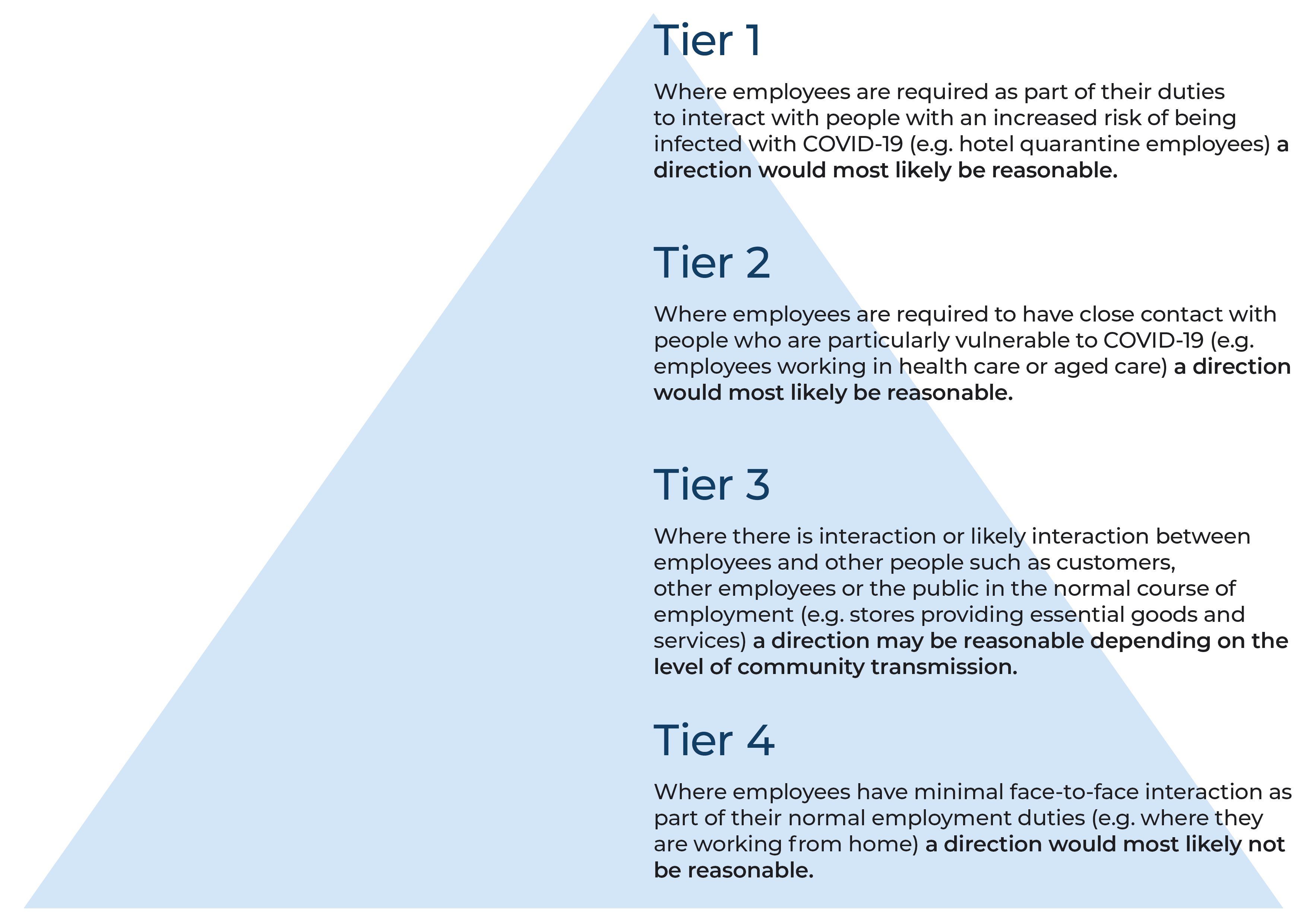01 September 2021
8 min read
Published by:

The impact of the COVID-19 Delta variant across the country is challenging how governments, public health experts and employers respond to the COVID-19 pandemic.
The Federal and State Governments have introduced vaccination targets of up to 80 per cent to combat the current outbreak and allow the easing of COVID-19 restrictions. However, following the meeting of National Cabinet on 6 August 2021, Prime Minister Scott Morrison has confirmed that, with the exception of limited public health orders for high-risk industries, the Federal and State Governments will not roll out a mandatory vaccination policy in order to achieve their vaccination targets.
Instead, the question of mandating vaccinations has largely been deferred to employers. Prime Minister Scott Morrison has indicated that for certain employers, it might be reasonable to require employees to be vaccinated. However, employers will bear the legal risk of ensuring a direction is lawful.
In NSW, as the positive case numbers continue to rise, the NSW Government has issued a number of public health orders which fall short of mandating vaccination, but which allow work in certain industries and in certain locations conditional on employees having received at least a single dose of a COVID-19 vaccination. As a result, employers are effectively faced with either requiring employees to be vaccinated, or stand down unvaccinated workers who cannot comply with the public health orders.
On 12 August 2021, the Fair Work Ombudsman (FWO) released its updated guidance material on COVID-19 vaccination. The guidance from the FWO leaves the decision squarely with individual employers to determine whether it is lawful and reasonable to require their employees to be vaccinated.
While some companies, including SPC and Qantas, have announced mandatory vaccination policies, it is still to be seen whether these directions are lawful. Employers will bear the legal risk of their policies. As a result, many employers are questioning whether they can require their employees to be vaccinated.
In this article, we explore the legal basis for a mandatory vaccination policy and the key legal considerations for employers. Employers should carefully consider their own position and obtain legal advice before implementing a mandatory vaccination policy.
Whether employers can require employees to be vaccinated against COVID-19 is a complex question. In short, in the absence of a government mandate, an enterprise agreement or a contract of employment that expressly requires an employee to be vaccinated for COVID-19, an employer can only direct an employee to be vaccinated if it is “lawful and reasonable”. The assessment of what is a lawful and reasonable direction will be determined on a case-by-case basis.
The updated FWO guidance materials assist employers in navigating this complex question. The FWO has divided work into four tiers. Each tier reflects the likelihood that a direction to mandate a vaccination will be reasonable.

The FWO clearly states that, notwithstanding its tier approach, the reasonableness of a direction will be assessed on a case-by-case basis. If a direction is challenged, a court or the Fair Work Commission (FWC) will take into account a range of factors when determining the reasonableness of a direction, which may include:

This is not an exhaustive list. Employers who are considering mandating the vaccine must take into account that each matter will be considered on a case-by-case basis, and factors outside the ones listed above may be relevant.
Mandatory vaccination policies come with significant legal risks and employers should consider the following matters before implementing a policy:
Work health and safety laws (WHS laws)
Employers have a general duty to ensure, so far as reasonably practicable, the health and safety of workers and other persons who may be impacted by the work carried out as part of their business or undertaking.
For an employer to satisfy their safety duty, they are required to put in place control measures to eliminate, or if that is not possible, minimise the risk to health and safety. Therefore, employers must implement higher order controls that eliminate or otherwise minimise the risk. The guidance from SafeWork NSW is that mandatory vaccinations are a high order risk control measure against COVID-19 and when a COVID-19 vaccine is generally available, businesses may require workers to be vaccinated for COVID-19 if it is reasonably practicable to do so.
However, SafeWork Australia’s position is that it is unlikely that a mandatory requirement to be vaccinated will be reasonably practicable. That is, an employer is not likely to be required to ensure that employees are vaccinated in order to satisfy its WHS obligations. However, for each business, what is reasonably practicable will involve employers weighing a number of factors, particular to the work being performed regarding:
This approach aligns with the Australian Government’s approach that a person conducting a business or undertaking may mandate vaccinations in certain circumstances. Employers should adopt the hierarchy of controls and implement higher order controls first. However, other risk control measures, such as working from home arrangements or social distancing, could together provide adequate control measures.
In any event, employers have consultation obligations under WHS laws regarding the implementation of new controls. As such, employers should consult with employees regarding the control measures proposed to be implemented to eliminate or minimise the risk of COVID-19. Employers should consult with employees, even when following advice from health authorities.
Privacy obligations
Information about an employee’s vaccination status is considered ‘sensitive information’, and employers must be able to satisfy the requirements under the Australia Privacy Principles for the collection of vaccination status. Generally, an employer will need to seek consent and justify the collection as “reasonably necessary” for the business’s functions or activities, which may include preventing or managing health and safety risks.
See our earlier article that sets out further information regarding your privacy obligations and COVID-19.
Discrimination legislation
If a workplace introduces a mandatory vaccination policy, employers will need to manage the associated discrimination risks carefully.
A mandatory vaccination policy is likely to give rise to the risk of indirect discrimination complaints. Indirect discrimination occurs when a person is required to comply with a condition or requirement, but is unable to comply because of a protected attribute, such as a disability or religious beliefs. As a result, the condition or requirement has the effect of disadvantaging a person with that protected attribute.
However, such a condition or requirement will be lawful discrimination, if the requirement or condition to be vaccinated is reasonable, having regard to the circumstances of each case. So if there is a public health order requiring vaccination, then it may be lawful discrimination.
Employers will also need to consider their duty to provide ‘reasonable adjustments’ for any employee with a disability who is unable to comply with a vaccination requirement, if that is a requirement of their role. Depending on the circumstances, an employer will need to make reasonable adjustments for an employee who is unable to be vaccinated because of a disability, unless to do so would impose ‘unjustifiable hardship’ on the employer.
In light of these challenges, mandatory vaccination policies will need to be drafted carefully to ensure that they do not discriminate against individuals with a protected attribute under discrimination laws. Flexibility may need to be afforded to those employees who are unable to get the vaccine.
Dismissal related claims
Employers will need to consider how it may lawfully enforce a mandatory vaccination policy.
If an employee is dismissed or demoted or subject to any other adverse action because of a refusal to comply with a direction, and the employee has genuine medical or religious grounds for refusing to comply, employers may be exposed to the risk of discrimination, general protections or an unfair dismissal claim.
Employees may also challenge a termination by reason of a failure to follow a lawful and reasonable direction on the basis that a direction to be vaccinated was not ‘lawful or reasonable’. This will go to the heart of whether an employer has a valid reason for dismissal.
Workers compensation risks
Employers will also need to consider the workers’ compensation risks from contracting the virus in the workplace. Recently the Personal Injury Commission, in Sara v G & S Sara Pty Ltd [2021] NSWPIC 286, found an employee was in the ‘course of his employment’ when he contracted COVID-19, and compensation was awarded.
Employers should also consider the risks of workers compensation claims arising from any injury arising from a vaccine that is mandated in the workplace.
5 Seek legal advice
Given the complicated nature of mandating vaccinations, employers should seek legal advice on the risks associated and seek assistance in drafting the policy.
If you wish to discuss options for your business, please contact us.
Authors: Michael Selinger, Jennifer van Bronswijk, Natasha Jones, Julia Wyatt & Olivia Lawrence
Disclaimer
The information in this publication is of a general nature and is not intended to address the circumstances of any particular individual or entity. Although we endeavour to provide accurate and timely information, we do not guarantee that the information in this article is accurate at the date it is received or that it will continue to be accurate in the future.
Published by: